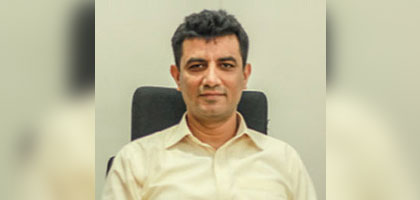Faculty Achievement View More Faculty Achievements

Recognition
Dr. Junaid Alam Khan, Dr. Lubna Naz, and Dr. Khadija Bari
IBA faculty members secured the distinguished Demographic and Health Surveys (DHS) Fellowship awarded by USAID
Dr. Lubna Naz, Assistant Professor, School of Economics and Social Sciences (SESS); Dr. Khadija Bari, Director, Population Research Centre; and Dr. Junaid Alam Khan, Director, Talent Hunt Programs; secured the distinguished Demographic and Health Surveys (DHS) Fellowship awarded by the United States Agency for International Development (USAID).
The DHS Fellowship is highly competitive and granted to those whose research proposal meets the strict criteria of novelty, clarity, and alignment with the United Nations’ Sustainable Development Goals relating to maternal and child health.
We congratulate Dr. Lubna Naz, Dr. Khadija Bari and Dr. Junaid Alam Khan on this remarkable achievement and wish them success in their future endeavors.
Published Works
IBA Faculty co-authors a paper on food loss and waste in the Western Balkans
Dr. Junaid Alam Memon, Professor, Department of Social Sciences, School of Economics and Social Sciences (SESS), co-authored a research paper titled, 'Research on food loss and waste in the Western Balkans: A systematic review'. The research paper is published in the Journal of Frontiers in Nutrition.
Abstract
Food losses and waste (FLW) is considered a critical issue in the ongoing debate on the sustainability of agri-food systems. However, the scholarly literature on FLW is still geographically-biased, with more attention devoted to developed countries, even in Europe. In this context, this article analyses the state of research on FLW in the Western Balkan region (viz. Bosnia and Herzegovina, Croatia, Montenegro, North Macedonia, and Serbia). A search performed in October 2021 on the Web of Science database returned 34 documents, and 21 eligible ones were included in the systematic review. The topical analysis of the literature addressed causes of FLW, stages of the food supply chain, extent and magnitude of FLW, FLW and food security, economic and environmental impacts of FLW, and food waste (FW) management strategies. A central finding was the scarcity of data on FW in the Western Balkans. Moreover, the literature focused on FW at the consumer level, while food loss at other stages of the food chain was generally overlooked. There is a lack of comprehensive analyses of the economic and environmental impacts of FLW as well as its implications in terms of food and nutrition security. The quantification of FLW is generally inaccurate and based on estimates and self-reported data. The literature focuses on FW reuse and recycling (e.g. energy, compost) while other management strategies (e.g. reduction/prevention, redistribution) are rarely addressed. However, the results indicated that consumers in the Western Balkans pay attention to the FW issue, especially during the COVID-19 pandemic, which is an encouraging sign that can be exploited in awareness-raising campaigns and education activities. Meanwhile, research on FLW in the Western Balkans is highly needed to fill the identified knowledge gap and provide evidence to policies dealing with the transition to sustainable food systems in the region.
The article can be accessed here.
Published Works
IBA Faculty co-authors a paper analyzing the demand for natural gas
Dr. Junaid Alam Memon, Professor, Department of Social Sciences and Liberal Arts, School of Economics and Social Sciences (SESS), co-authored a research paper titled, ‘A time series forecasting analysis of overall and sector-based natural gas demand: a developing South Asian economy case’. The research paper is published in the Journal of Environmental Science and Pollution Research International.
Abstract
Pakistan is developing South Asian country which is currently considering alternative energy sources including coal, solar, compressed natural gas, and wind energy to cope with the worst energy crisis in its history. Moreover, the policy promotion of compressed natural gas especially in the transport sector has raised concerns about the demand management of natural gas to avoid future shortages and ensure sustainable use of this precious non-renewable source of energy. Against this background, this study aimed to forecast natural gas demand in Pakistan for the 2016-2030 period by applying relevant univariate time series econometric methods. Apart from forecasting the overall natural gas demand, the forecasting analysis is also conducted for natural gas demand in Pakistan's total natural gas consumption and also for natural gas consumption across the household, industrial, commercial, transport, fertilizer production, power generation, and cement production sectors. Overall, the findings revealed that ARIMA is the appropriate model for forecasting gas consumption in Pakistan. Further, the growth of increase in the level of compressed natural gas consumption in the household sector is more as compared to all other sectors of the economy up to the year 2030. The key findings show that (a) natural gas consumption is likely to grow with time, (b) mixed projection trends are observed for the overall natural gas consumption and other sector-based natural gas consumption trends, and (c) the difference between natural gas consumption and production in Pakistan is likely to grow leading to 2030. As part of the policy recommendation in line with the findings, policymakers in Pakistan should increase the availability of natural gas, particularly in sectors where its consumption is likely to be declining. In addition, more proactive measures should be undertaken to explore the existing natural gas reserves in the long run while also importing natural gas from the neighboring nations in the short run. Furthermore, the government of Pakistan should seriously consider strategizing the development of the nation's compressed natural gas sector.
The article can be accessed here.
